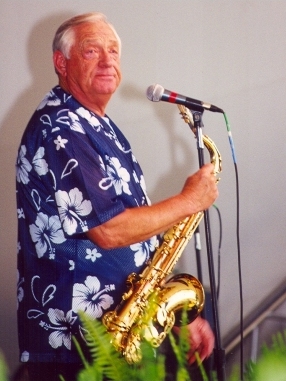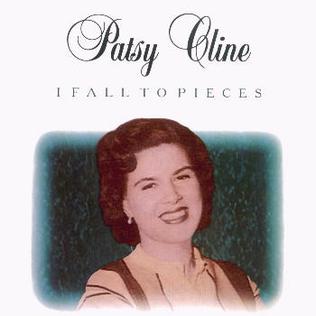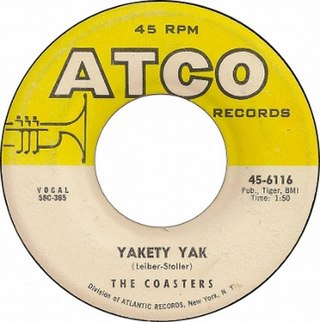Related Research Articles

Homer Louis "Boots" Randolph III was an American musician best known for his 1963 saxophone hit "Yakety Sax", which became the signature tune of The Benny Hill Show. Randolph was a prolific session musician and member of the Nashville A-Team, performing on numerous notable recordings by artists including Chet Atkins, Elvis Presley, Roy Orbison, Brenda Lee, and Al Hirt. During the span of his more than forty-year music career, Randolph performed in hundreds of venues alongside many artists in pop, rock, jazz, and country music.

"Yakety Sax" is a pop novelty instrumental jointly composed by James Q. "Spider" Rich and Boots Randolph.
"I Believe" is a popular song written by Ervin Drake, Irvin Abraham, Jack Mendelsohn and Al Stillman in 1953. The most popular version was recorded by Italian-American singer Frankie Laine, and spent eighteen weeks at No. 1 on the UK Singles Chart.
"The Poor People of Paris" is a US pop song that became a number-one instrumental hit in 1956. It is based on the French language song "La goualante du pauvre Jean", with music by Marguerite Monnot and words by René Rouzaud. Edith Piaf had one of her biggest hits with the original French version.

"I Can't Stop Loving You" is a popular song written and composed by country singer, songwriter, and musician Don Gibson, who first recorded it on December 3, 1957, for RCA Victor Records. It was released in 1958 as the B-side of "Oh, Lonesome Me", becoming a double-sided country hit single. At the time of Gibson's death in 2003, the song had been recorded by more than 700 artists, most notably by Ray Charles, whose recording reached No. 1 on the Billboard chart.

"I Fall to Pieces" is a song written by Hank Cochran and Harlan Howard that was originally recorded by Patsy Cline. Released as a single in 1961 via Decca Records, it topped the country charts, crossed over onto the pop charts and became among Cline's biggest hits. Cline was initially reluctant to record "I Fall to Pieces" and believed its production lacked enough country instrumentation for her liking. Eventually, Cline recorded the song upon the encouragement of her producer.

"Yakety Yak" is a song written, produced, and arranged by Jerry Leiber and Mike Stoller for the Coasters and released on Atco Records in 1958, spending seven weeks as #1 on the R&B charts and a week as number one on the Top 100 pop list. This song was one of a string of singles released by the Coasters between 1957 and 1959 that dominated the charts, making them one of the biggest performing acts of the rock and roll era.

Elvis for Everyone! is a compilation album by American singer and musician Elvis Presley, issued by RCA Victor in mono and stereo, LPM/LSP 3450, on August 10, 1965. Recording sessions took place over a ten-year span at Sun Studio in Memphis, RCA Studio B in Nashville, Tennessee, and Radio Recorders in Hollywood, California. It peaked at number 10 on the Top Pop Albums chart.

Neck to Neck is a collaborative album by American guitarist Chet Atkins and British singer-songwriter and guitarist Mark Knopfler, released on October 9, 1990, by Columbia Records. "Poor Boy Blues" was released as a single.

G.I. Blues is the third soundtrack album and seventh (overall) album by American singer and musician Elvis Presley, released by RCA Victor in mono and stereo, LPM/LSP 2256, in October 1960. It is the soundtrack to the 1960 film of the same name in which he starred. Recording sessions took place on April 27 and 28, and May 6, 1960, at RCA Victor Studio C and Radio Recorders in Hollywood, California. The album topped the Billboard Top Pop Album chart. It was certified gold on March 13, 1963 and platinum on March 27, 1992 by the Recording Industry Association of America. The album remained at the #1 spot for ten weeks.

More of That Guitar Country is the twenty-seventh studio album by US country musician Chet Atkins. It is a follow-up to his Guitar Country release and was more successful. His rendition of "Yakety Sax" by Boots Randolph earned Atkins a hit on the country singles charts. A mix of traditional fingerpicking, country-flavored pop and traditional country, the album peaked at number 4 on the Billboard Country charts.

The Best of Chet Atkins is a compilation recording by American guitarist Chet Atkins, released in 1964.

"You'll Be Gone" is a song recorded by Elvis Presley and published by Elvis Presley Music and released in 1965 on the Girl Happy soundtrack album and as a 45 single. The song was recorded in 1962 and was one of very few which Presley was involved in writing; his co-writers were his bodyguard Red West and Charlie Hodge. The other song that Elvis Presley composed was "That's Someone You Never Forget" in 1961 with Red West, which was on the Pot Luck LP released in 1962. The song was recorded on Sunday, March 18, 1962, at RCA Studio B in Nashville, Tennessee.
"Gotta Travel On" is an American folksong. The earliest known version was printed in Carl Sandburg's The American Songbag in 1927 under the title "Yonder Comes the High Sheriff" and several variations were recorded in the 1920s, but the best known version is credited to Paul Clayton, The Weavers, Larry Ehrlich, and Dave Lazer and was first recorded by Pete Seeger in 1958.
"Meet Mister Callaghan" is a 1952 song written by Eric Spear and performed by Les Paul in a hit recording.
"Tallahassee Lassie" is a song written by Bob Crewe, Frank Slay, and Frederick Picariello and performed by Freddy Cannon . The song was featured on his 1960 album The Explosive! Freddy Cannon. The song was produced and arranged by Bob Crewe and Frank Slay.
"Trying" is a song written by Billy Vaughn and performed by The Hilltoppers. It reached number 5 on the Cashbox chart and number 7 on the U.S. Billboard pop chart in 1952.
"Sleep" is a song written by Earl Burtnett and Adam Geibel in 1923. The song's melody is based on a motif from "Visions of Sleep", a 1903 composition by Geibel. The song was released by Fred Waring's Pennsylvanians in 1923, becoming the band's first hit and their signature theme. The song was also the theme for the television musical variety show The Fred Waring Show. The lyrics for the song were written by Waring's brother, Tom, who sang on the recording as well.
"Tuff" is a song written and performed by Ace Cannon, and was arranged and produced by Carl McVoy. It was featured on his 1962 album Tuff-Sax.

"My Dad" is a song written by Barry Mann and Cynthia Weil and performed by Paul Petersen. It reached #2 on the adult contemporary chart, #6 on the U.S. pop chart, and #19 on the U.S. R&B chart in 1963. It was featured on his 1963 album, My Dad.
References
- ↑ "Don Robertson, "The Happy Whistler" Chart Positions" . Retrieved August 24, 2018.
- ↑ "1956's Top Popular Records" Billboard January 26, 1957: 60
- ↑ "Cyril Stapleton featuring Desmond Lane, "The Happy Whistler" Chart Position" . Retrieved August 24, 2018.
- ↑ "Eddie "Lockjaw" Davis Trio, "The Happy Whistler" Single Release" . Retrieved August 24, 2018.
- ↑ "Boots Randolph, Boots Randolph's Yakety Sax". Discogs . 1960. Retrieved August 24, 2018.
- ↑ "Ernie Fields, "The Happy Whistler" Single Release" . Retrieved August 24, 2018.
- ↑ "The Echoes, "The Happy Whistler" Single Release" . Retrieved August 24, 2018.
- ↑ "Jimmie Haskell and His Orchestra, "Boom" Single Release". Discogs . December 1965. Retrieved August 24, 2018.
- ↑ "Glenn Yarbrough, Come Share My Life". Discogs . 1965. Retrieved June 23, 2024.
- ↑ "Sandy Nelson, Groovy". Discogs . 1970. Retrieved August 24, 2018.
- ↑ "Reginald Dixon, Reginald Dixon at the Organ". AllMusic . Retrieved August 24, 2018.